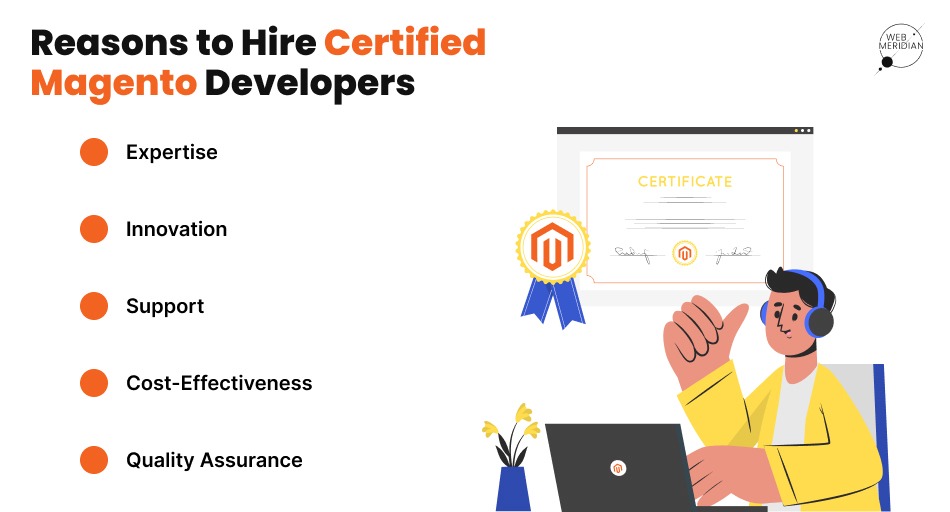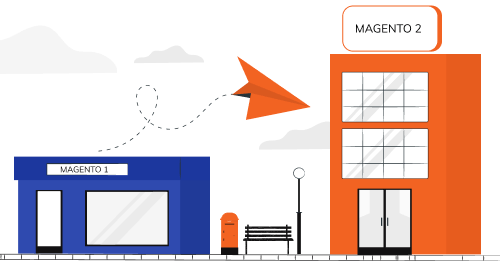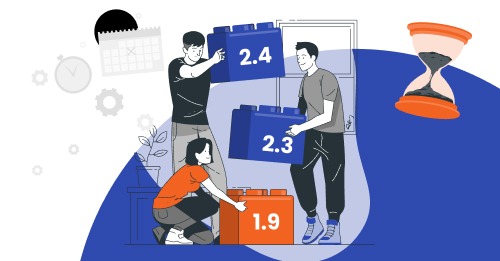Welcome to the jungle of Magento development! If you’re an eCommerce venture owner, you know how essential it is to have a reliable and effective way to build your online store. Magento is a master solution that proves it continues to be on the cutting edge of eCommerce.
However, Magento is a complex platform with many intricate details that require specific knowledge and expertise to work with effectively.
This is where certified Magento developers come in. In this article, we’ll explore the many benefits you can get with certified Magento developers and why they are essential for your next eCommerce project.
So, whether you’re new to Magento or a seasoned user, this guide offers an in-depth understanding of the importance of certified Magento developers for your eCommerce project.
- Freelancer vs. Magento Agency: Who to Hire?
- Key Technologies Magento Developers Should Master
- What is Magento Certification?
- Magento Certifications Types
- Reasons to Choose Certified Magento Developers
- Magento Developer Rate Breakdown
- Overview of the Magento Certification Journey
- TOP 5 Questions for Magento Certified Developers to Understand Their Expertise
- Make The Most of Magento With Certified Devs
Get A Magento Expert Consultation
Our Adobe Business Practitioner conducts site audit to optimize your eCommerce weaknesses.

Freelancer vs. Magento Agency: Who to Hire?
There are numerous arguments in favor of each option. But which path should you choose? How can you guarantee high quality without an exorbitant cost? We’ll explore each opportunity in detail to understand which one is your perfect fit.
Benefits and risks of cooperating with a freelancer
Let’s start by evaluating the potential advantages and drawbacks of hiring a freelancer.
Benefits:
- Accessibility. Magento programmers are available across different platforms and can usually start working right away.
- Lower costs. As a rule, freelance developers have lower hourly rates than agencies.
- Focused expertise. Freelancers typically have a narrow specialization in one or more areas.
- Personalized communication. When cooperating with a freelancer, you’ll have direct communication with your developer.
- Prompter project fulfillment. This is possible only when a freelancer works on a single project at a time.
Risks:
- Availability gaps. If freelance programmers handle several projects simultaneously, it can lead to unpredictable delays.
- Potential lack of skills. Independent Magento developers do not have equal skills and experience. Therefore, employers may fight to find the right talent.
- Reliability compromises. Establishing trust with freelancers may take time and effort since the vetting process rests on the employer’s shoulders.
Why a professional agency with Magento certified developers can be a better choice
Magento is a comprehensive platform. To squeeze the maximum fruits from its capacity, you may need to implement tailored features and enhancements. Therefore, hiring an agency that provides top Magento 2 certified developers can be a more reliable path to success.
Advantages of cooperating with a professional development agency:
- The best certified Magento experts. Software development companies have a vast pool of specialists, each focusing on specific areas of Magento programming.
- The opportunity to cope with complex projects. Agencies are well equipped to master multifaceted projects requiring diverse skills.
- Domain expertise. Professional teams have knowledge and experience in various industries.
- Comprehensive skills. Agencies usually offer all-encompassing teams, including certified Magento experts, project managers, UI/UX designers, marketing consultants, and SEO specialists.
- Continual support. As a rule, companies deliver support and maintenance services after the project is completed.
- Reliability. A certified Magento company has established procedures to guarantee non-compromised quality and timely delivery.
Development costs: How to ensure value for money?
Cost-efficiency is crucial for any project, including Magento development. If you are hesitating between hiring a freelancer and a certified Magento developer, evaluate the costs versus your project’s demands and goals. Freelancers’ rates may range from $20 to $100 per hour, while Magento certified programmers are a bit more expensive: $75 – $200 per hour. However, the higher price in many cases is justified.
To guarantee you optimize your budget and reach your goals, assess project complexity, required expertise, and long-term maintenance needs.
- Smaller and narrowly targeted projects can be efficiently fulfilled by freelance developers. Although the hiring procedures and risk mitigation stay on the businesses’ side in this case, the gains will include flexibility and cost minimization.
- Large and complex projects will benefit from a certified development agency. They provide dedicated teams, have well-organized processes, and guarantee exhaustive support. Therefore, clients can be confident in quality results.
Boost Your Conversions with Expert CRO Consultants!
Driving traffic to your website is only half of the way. The visitors’ further trip through your sales funnel determines your revenues. Talk to our conversion rate optimization consultants to understand the potential areas that may hinder the consumer path, and let’s refine it together for greater conversions.

Key Technologies Magento Developers Should Master
Magento is undeniably one of the top ecommerce frameworks in the modern world. Thousands of online stores running on this platform would confirm its flexible, scalable, and innovative nature that helps their businesses thrive.
The platform’s remarkable success is backed not only by its powerful functionality but also by a mighty community of experienced Magento experts who keep reinforcing Magento’s role in the ecommerce industry.
Which skills should the best Magento certified developers possess to contribute to the field? Let’s explore the primary technologies that Magento programmers often deal with in their work.
GraphQL, PWA Studio, and Headless Commerce
To begin with, we’d emphasize the importance of GraphQL for certified Magento experts. Although there are numerous ways to work with API, GraphQL has proven its efficiency and advantages for businesses. Thus, when a user proceeds to browse the site after the initial load, GraphQL accumulates only those parts of information that are requested instead of providing the entire data volume.
Magento PWA Studio grants Magento 2 certified developers the opportunity to construct Progressive Web Applications in a quick and cost-saving manner. Such apps are essential for modern businesses since they operate instantly, are mobile-oriented and straightforward, and work even offline.
Headless commerce is a breakthrough Magento approach that implies web architecture, empowering the separation of a site’s frontend from its backend. Certified Magento ecommerce developers familiar with this architecture can provide flexible integrations across platforms, enable different user interfaces for various gadgets, and enhance the overall UX.
Integration with ERP, CRM, and marketing tools
Smooth internal procedures and efficient marketing activities are paramount for resilient business expansion. Enterprise Resource Planning (ERP) is necessary to control inventory and consumer orders. Customer Relationship Management (CRM) systems empower personalized consumer interactions and help craft delightful shopping paths. Handy marketing functionalities like email automation and analytics relieve merchants from numerous repetitive and time-consuming tasks.
Certified Magento 2 developers should be able to perform these integrations seamlessly through the understanding of APIs, webhooks, and middleware.
DevOps і CI/CD in Magento projects
Expeditious and flexible development processes are the cornerstone of excellent business performance. Magento projects set high standards for DevOps expertise that assists in arranging smooth development and launches. The top certified Magento developer must be able to implement CI/CD (Continuous Integration and Continuous Deployment) pipelines to establish testing automations, minimal downtime, and continual updates. Knowledge of Docker, Kubernetes, and version control (Git) facilitates and speeds up development.
What is Magento Certification?
A Magento Certification is like a badge of assurance from Adobe, signifying that a developer has mastered creating stunning and efficient eCommerce stores using the Magento platform. Think of it as a black belt in the world of coding.
But getting a Magento Certification is no easy feat. It requires a deep understanding of the platform, a comprehensive knowledge of eCommerce, and the ability to solve complex problems easily. It’s a rigorous process that tests a developer’s skills and abilities to the limit.
Given that these certifications have expiry dates, a developer has to renew them by doing the exam to show they still have what it takes.
The Magento certification lets you know the developer you’re hiring is the real deal. They have the expertise and knowledge to deliver exceptional results on your eCommerce project. But more than that, a certified Magento developer can help you unlock the platform’s full potential, making your online store more efficient, user-friendly, and profitable.
In short, a Magento Certification is not just a piece of paper. It’s a mark of excellence, a symbol of expertise, and a quality guarantee. So, hiring a certified Magento developer is a must if you’re looking to build a successful eCommerce store.
Magento Certifications Types
Magento’s certificates are spread out to touch on all areas of expertise, from front-end development to cloud deployment. They show the holder’s mastery of Magento and the ability to use its capabilities to make exceptional eCommerce experiences.
In addition, since Adobe acquired Magento in 2018, the certificates are now recognized as part of Adobe’s program, offering a broader recognition of the skills of Adobe Magento certifications.
The most well-known types of Magento certifications include the following:
Magento 2 Solution Expert/Specialist
It is intended for business analysts, consultants, and project managers who want to show their prowess in Magento 2. The topics covered here include things like Magento 2’s architecture, functionalities, and user value.
With this certificate, a developer understands Magento 2’s operation and is fully equipped to give recommendations on solutions aligning with a business’s needs.
Magento 2 Certified Associate Developer
This development accolade shows a developer’s know-how of the platform’s fundamental principles, like customization methods, database changes, and UI tweaking.
The Magento 2 Associate Developer certification focuses on underlying developmental concepts that bring together:
- Magento 2 architecture and components
- Basic customization and coding tricks using Magento 2
- Database schema and data models
- Magento 2 checkout and payment procedures.
By obtaining M2CAD certification, individuals demonstrate their capability to develop essential Magento 2 elements, including what they understand about Magento 2 best coding practices and built.
Holders can work as Magento 2 developers and contribute to building and maintaining eCommerce projects using Magento.
Magento 2 Certified Professional Dev
A Magento 2 certified expert developer gains the mastery of the platform and takes this exam to showcase developing expertise. The exam covers advanced topics like performance tuning, caching, debugging, and testing and deploying best practices.
To earn the Magento professional developer certification, developers must excel in a 90-minute exam that covers topics such as Magento architecture, implementing modules, and customizing elements.
The Magento 2 Certified Professional Developer exam shows that developers strictly grasp the best developmental practices. The ideal techies for the test are principally developers who regularly work with Magento 2 and have a firm mastery of the technology stack and DevOps processes.
Magento 2 Professional Developer Plus
If you’re scouring the internet for a skilled developer to build complicated eCommerce solutions on Magento, consider someone with the M2PDP certificate. The certificate is meant for the highest level of Magento developers who have demonstrated a mastery of advanced development approaches and an in-depth grasp of the architecture.
The certificate holders are highly skilled and experienced, having already cleared the M2CPD exam and worked to create complex Magento projects for at least 24 months. They understand Magento Open Source, Magento Commerce Cloud, and Magento Commerce Enterprise and are proficient in performance optimization, scalability, security, and integration with third-party systems.
To round out their skills, the professional developer plus graduates demonstrate their experience managing a team of developers or leading a development project.
Magento 2 Front-End Dev
Business bosses looking to engineer an appealing, user-friendly storefront on Magento 2, hiring a Magento 2 Front-End Developer with a certificate is the way to go. This certificate demonstrates a candidate’s prowess in customizing/tailoring Magento storefronts’ look, feel, and functionality with tech such as HTML, JavaScript, and CSS.
The test aims at topics that include Magento 2 front-end architecture fundamentals, layout customization, theming, and responsive design. The certificate holders should be able to integrate third-party features and tailor the shop’s face by leveraging the Magento UI library.
A Magento 2 certified front-end developer understands the best Magento practices in front-end development to offer unique, tailored solutions to enterprises and consumers. Hiring a certified Magento 2 Front-End Developer means enterprises feel at ease when developing the shop and user experience that accompanies it.
Magento 2 JavaScript Developer
To earn this certificate, a developer has to demonstrate their skills to design, implement, and tailor Magento 2 JavaScript elements, following the best practices.
The test evaluates the candidate’s ability to develop Magento-two themes, tailor them using JavaScript, debug JavaScript in Magento 2, and implement JavaScript modules and widgets in Magento 2 (with the capability to customize and configure them).
Earning the Adobe Certified Expert in M2JD certificate requires candidates to comprehensively master modern JavaScript development, including advanced concepts such as object-oriented programming and JavaScript module bundlers.
The candidates’ abilities to apply their know-how to developing Magento 2 JavaScript elements are tested.
The Magento 2 JavaScript Developer certificate is ideal for front-end developers focused on Magento 2 development and those who want to add modern JavaScript development in the context of Magento 2 to their skill set.
Magento 2 Cloud Developer
Magento 2 Cloud Certification exams are taken by developers specializing in creating and maintaining Magento Commerce Cloud implementations. It certifies the developer’s ability to deploy and manage cloud-hosted Magento stores.
Developers are tested on cloud architecture, deployment, and infrastructure management topics, including Magento Cloud tools and services. It also tests the candidate’s proficiency in configuring and managing cloud environments, security, and performance optimization.
A Magento-certified professional cloud developer should be able to deploy, run, and tailor /optimize cloud-hosted stores.
Reasons to Choose Certified Magento Developers
Why settle for a mediocre site when you can have an exceptional one? Hiring a competent Magento developer can take your eCommerce website to the next level, ensuring it’s reliable, secure, and innovative.
Certified developers can set up a website that meets your unique specifications and is well-designed to help your enterprise thrive, given how well they have mastered the platform, consistently implement best practices, and access cutting-edge eCommerce technologies and trends.
Let’s talk about what you get when collaborating Magento certified partners.
1. Expertise
Certified Magento 2 developers understand Magento’s complex architecture, key elements, and modules. They learn about routing, models, views, blocks, controllers, helpers, and other vital elements of Magento’s architecture to help businesses develop and maintain high-quality eCommerce websites that are scalable, secure, and geared for performance.
Certified candidates internalize crucial skills essential for eCommerce website development, including proficiency in PHP (Magento’s primary programing language) and MySQL (the database system used by Magento) and the prerequisite skills to design and optimize databases for eCommerce applications.
They can leverage Magento’s API to integrate with third-party services and systems like shippers, payment providers, and marketers and use Magento’s built-in features, including product management or customer management, to build efficient operations.
2. Innovation
Certified Magento 2 developers remain updated with new eCommerce technologies and changes. You can bet on them for the best software development tools, coding tricks, and high industry standards. This knowledge enables them to develop and implement innovative strategies that keep your business venture competitive and on the bleeding edge.
For instance, certified Magento developers can adopt new inventions like machine learning, artificial intelligence, and chatbots to improve the user experience and drive sales.
Furthermore, certified Magento developers have experience creating extensions and unique modules to add functionality to the site. These customizations can set your website apart from competitors and give your customers a one-of-a-kind experience.
3. Support
Certified Magento developers can quickly get advice from the Magento expert community and designated customer service team. Such access is crucial to resolve website problems, including security concerns, technical difficulties, configuration issues, etc.
In addition, certified developers are familiar with Magento’s support documentation and can leverage it to provide more efficient solutions to issues. This helps reduce downtime for your website and ensures that the solutions implemented align with Magento’s best practices and guidelines.
4. Quality Assurance
A Magento 2 certificate holder is trained to follow Magento’s best practices and high standards in quality when developing and maintaining eCommerce websites. This includes ensuring the website is secure, scalable, and performs efficiently.
They also ensure that the site follows Magento’s coding best practices, which makes it easier to maintain and extend over time. Certified developers also learn how to run the website through the wringer in testing to identify and fix any bugs or issues before the website goes live. This ensures that the site meets or exceeds Magento’s specifications and provides a high-quality experience for users.
5. Cost-Effectiveness
You pay for efficient and effective development when you choose qualified Magento 2 developers. Certified developers can often complete milestones speedy and more accurately than non-certified developers, resulting in cost savings for your enterprise.
Additionally, certified developers are less vulnerable to making mistakes or encountering issues that could result in costly downtime or data loss, saving you money and protecting your reputation in the long run. Furthermore, certified developers are trained to follow best practices for eCommerce development, which can save you money by avoiding costly mistakes when inexperienced developers attempt to create complex eCommerce solutions.
For instance, Magento certified developers are knowledgeable about security and can help protect your website from potential breaches or attacks, which could result in costly data loss or legal liabilities.

Magento Developer Rate Breakdown
Rates might differ depending on a variety of criteria, including experience, proficiency, and regional economic conditions. As you are aware, the cost of a Magento developer is affected by region. Fees for US e-commerce websites can be significantly higher, while Southeast Asian prices are the lowest, ranging from $15 to $30 per hour. The hourly rate for a Magento developer in various countries is broken out further below.
Hourly Rates of Magento Developers With VS Without Certification
| Region | Rate of a Certified Magento Developer, $ per hour | Rate of an Average Magento Developer, $ per hour |
|---|---|---|
| North America: The USA and Canada | 125-250 | 100-200 |
| South America: Argentina, Brazil, Chile, Colombia, Mexico, Peru | 80-105 | 70-90 |
| Australia | 150-275 | 100-180 |
| Western Europe: Germany, France, Italy, Spain, Estonia, Netherlands | 80-100 | 60-90 |
| Eastern Europe: Ukraine, Poland, Romania, Bulgaria | 40-70 | 30-60 |
| Africa: Egypt, Kenya, Morocco, Nigeria, South Africa | 30-50 | 20-40 |
| Asia: China, Bangladesh, India, Indonesia, Malaysia, Nepal, Pakistan, Philippines, Vietnam | 20-40 | 15-30 |
For the sake of transparency, let’s highlight the main factors affecting the hourly rates in each region in terms of strengths and weaknesses.
| Aspect | USA | India | Ukraine | South Africa |
|---|---|---|---|---|
| Pros | ||||
| Quality of Education | High-quality education systems | Strong emphasis on technical education | Strong focus on technical education | Good education system |
| Language Proficiency | English is the primary language | English | English | English |
| Cultural Compatibility | Cultural compatibility with Western businesses | Cultural differences may pose challenges | Shared cultural values with Europe and the US | Cultural compatibility with Western norms |
| ConsTime Zone Difference | Time zone differences may affect real-time collaboration | Significant time zone differences | Similar time zone to Europe | Similar time zone to Europe |
| Cons | ||||
| Hourly Rates | High hourly rates due to a higher cost of living | Low hourly rates due to a low cost of living | Moderate hourly rates due to a moderate cost of living | Moderate hourly rates due to a moderate cost of living |
| Availability of Talent | High demand for developers, potential scarcity | A large pool of developers but varying skill levels | Competitive market with skilled developers | Limited pool of developers with specific skills |
| Legal and Contractual Issues | Clear legal frameworks for contracts and employment | Legal frameworks can vary, and potential challenges | Transparent legal processes | Legal frameworks may vary |
To sum up, Ukrainian Magento certified developers stand out as a robust and well-rounded choice for various reasons:
- An Adobe-certified developer in Ukraine charges $40 to $70 per hour, while other tech experts like QA specialists, DevOps, and Project Managers charge $25 to $35.
- Ukrainian developers are known for their high-quality work and adherence to industry standards. Many Ukrainian developers undergo rigorous training and certification programs.
- Clients often achieve cost savings by hiring Ukrainian developers without compromising the quality of work.
- Ukraine has become a hub for IT outsourcing, and many companies worldwide choose Ukrainian developers for their projects. This outsourcing culture has led to a competitive market and reasonable rates.
Don’t Settle For Less Than Adobe Certified Magento Team
Need developers here and now? We reply within 24h of business days to start solving your Magento needs ASAP. No bugs, no delays, no hidden fees – only respect, expertise and top-performance.

Overview of the Magento Certification Journey
The certification program assesses developers’ skills and knowledge in multiple aspects of Magento 2, encompassing the installation and configuration of the framework and code modifications, such as customizing the Magento checkout.
For Magento developers, certification is crucial for ongoing career growth and development. Holding a Magento 2 certification serves as evidence of a high level of expertise in the platform, bolstering the credibility of developers in the eyes of merchants and employers. Furthermore, certification aids developers in staying abreast of Magento’s best practices and gaining an in-depth understanding of the platform.
Levels of Magento Certifications
Adobe offers three levels of Magento 2 certifications, which are:
- Adobe Commerce Certified Professional,
- Adobe Commerce Certified Expert,
- Adobe Commerce Certified Master exams.
Dive deeper into the differences in certification levels:
| Adobe Commerce Certified Professional | Adobe Commerce Certified Expert | Adobe Commerce Certified Master | |
|---|---|---|---|
| Intended Audience: | For individuals with a strong understanding & knowledge of the Magento. Developers; Lead Developers; Backend Developer; Solution Architects; Technical Leaders. | For those who have advanced skills & knowledge of Adobe Commerce. Workfront System Administrators; Process designer/architect; Business analyst; Technical Consultant; Configuration consultant. | For individuals who have a profound understanding of Adobe Commerce. Adobe Commerce Architect; Technical or Solution Architect; Technical Lead; Full Stack Developer; Senior Backend Developer; Senior Technical Consultant. |
| Level of Expertise: | An Adobe Professional works on a team and may lead simple projects. | An Adobe Expert can independently handle complex projects and mentor less experienced team members. | An Adobe Master leads complex projects, mentors team members, and collaborates on advanced planning and architecture design. |
| Minimum experience: | 0-12 months | 18-24 months | 3-5 years |
| Role: | Business Practitioner; Developer; Front-End Developer. | Business Practitioner; Developer; Front-End Developer. | Architect |
| Exam Duration: | 100-150 min | 100-130 min | 120 min |
| Cost of Certification: | $125 | $225 | $225 |
The Adobe Magento Certification Process
It typically involves the following steps:
- Choose a Certification: Select the Adobe certification that best matches your abilities and professional objectives. Adobe provides certifications for a variety of products and skill levels.
- Prepare for the Exam: Obtain the required information and abilities through training, self-study, or applicable experience. Adobe offers official study resources, training courses, and practice exams to assist applicants in their preparation.
- Register for the Exam: Sign up for the Adobe certification exam through the official Adobe Certification website. Pay any applicable fees for the exam.
- Take the Exam: Depending on the certification, take the scheduled exam in a testing center or via online proctoring. Complete the exam within the time limit.
- Receive Results: Adobe provides fast feedback on whether you passed or failed the exam when you complete it. If you pass, you will receive a digital badge and a certificate.
- Maintain Certification: Some Adobe certificates require periodic renewal to guarantee that qualified professionals are up-to-date on the latest technologies.
General info about Adobe certification:
- To register for a Magento certification exam, visit the official Magento website and follow the registration process outlined for your certification.
- Any level of the certification will be valid for two years. You should renew your certification if it is about to expire. Renewal options involve fewer questions and are free of charge.
- Magento certification exams are online assessments, typically requiring camera access.
- They consist of multiple-choice questions.
- The exam duration varies from 100 to 154 minutes.
- A passing score is 64% or above.
Adobe keeps a database of all certified partners because the number of certified specialists is closely related to their partner status. On their website, you can review a list of all Adobe Commerce Partners and refine the search results by geography, industry, partner level, or firm size.
TOP 5 Questions for Magento Certified Developers to Understand Their Expertise
Here’s how you can determine whether a developer is genuinely certified in Magento:
- Verify Credentials. Always ask for proof of certification from potential hires. This could be a digital badge, a certificate, or a profile on the Magento certification directory.
- Assess the Skill Set. Discuss potential project scenarios or challenges to gauge their problem-solving abilities. If they offer informed solutions, you can trust their expertise.
-
- Magento Best Practices. How familiar are you with Magento best practices and coding standards?
- Customization of Checkout Process. Have you worked on customizing the Magento checkout process in any of your projects?
- Installation and Configuration. Can you explain the process of installing and configuring Magento 2?
- Performance Optimization. What is your approach to optimizing the performance of a Magento website?
- Custom Theme Implementation. Have you implemented custom themes in Magento, and can you share examples?
- Security Considerations. How do you handle security considerations in Magento development?
- Integration of Third-Party Extensions. Can you describe your experience with integrating third-party extensions and modules?
- Multi-Store Setups. Have you worked on Magento projects involving multi-store setups?
- Handling Compatibility Issues. How do you address compatibility issues with Magento extensions during a project?
- Testing and Quality Assurance. What strategies do you use for testing and quality assurance in Magento development?
- Magento APIs and Web Services. Can you provide examples of your work involving Magento APIs and web services?
- Troubleshooting and Debugging. How do you approach troubleshooting and debugging in Magento?
- Payment Gateway Integrations. Have you implemented payment gateway integrations in Magento projects?
- Version Upgrades and Migrations. Can you share your experience with Magento version upgrades and migrations?
- Ask About Experience. Practical experience holds equal importance to certification. Learn about the developer’s past Magento projects, the challenges faced, and the outcomes achieved. Example:
-
- Question: Can you describe your experience with Magento 2 and your involvement in Magento projects?
- Answer: I have been actively working with Magento 2 for [X] years, contributing to [X] projects, including [mention specific projects].
- Request References. Request references from the developer’s past clients or employers. Speak directly with those who have worked with the developer to understand their work ethic, communication style, and ability to meet deadlines.
- Stay Updated with Magento Changes. Certified developers should regularly update their skills with the latest Magento versions. Check their certification date and ask about their familiarity with the latest Magento updates and their approach to adapting to changes.
Ensure the questions you ask are tailored to the project you aim to create and choose the most suitable certified Magento developer who meets all the criteria. Understand the difference between experience and expertise, and initiate the interview with simpler topics before delving into more complex ones.
Make The Most of Magento With Certified Devs
Having a Magento certification is a valuable asset for developers who work in eCommerce. It signifies a level of expertise and experience that can translate to improved website performance, customer satisfaction, and increased sales.
When you choose Magento 2 certified developers, you can be confident that your website will be in the hands of professionals who are up-to-date with the latest eCommerce trends and innovations.
Additionally, their knowledge of the Magento platform and its best practices can help you create a website that not only looks great but also runs smoothly and efficiently.
At WebMeridian, we pride ourselves on our certified team of Magento 2 developers who are dedicated to creating top-notch eCommerce websites for our clients. Contact us today to learn more about how we can help you build a successful online store with the help of a Magento-certified company.




